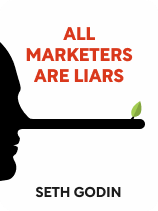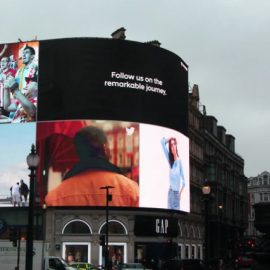

This article is an excerpt from the Shortform book guide to "All Marketers are Liars" by Seth Godin. Shortform has the world's best summaries and analyses of books you should be reading.
Like this article? Sign up for a free trial here .
What is ethical marketing? Is there a meaningful difference between fibs and frauds?
In All Marketers Are Liars, Seth Godin argues that good marketing is good storytelling. He explains that it’s ethical to stretch the subjective truth when you tell a story, but that you cross a line when you stretch the objective truth with claims that can be proven false.
Read more to learn the finer points of ethical marketing.
Ethical Marketing Distinguishes Fibs From Frauds
You now know the impact of an authentic, cohesive story across all points of contact with your consumer. So you just need to find a believable story, right? Yes, but Godin warns against getting carried away.
Marketers are selling the story and a feeling about the product, not the product itself. And if you’re marketing to a worldview, you’ll tell your story to people who want to listen. This leaves room for marketers to exploit consumers and the experience they hope for. But you shouldn’t deceive consumers with your storytelling.
What is ethical marketing? Godin believes that it involves knowing the difference between telling a fib and committing fraud—and he urges marketers to never commit fraud. We’ll discuss this difference, as well as some examples of each.
Fibs
Godin defines fibs as stories that stretch the subjective truth. If a fib is believed, it doesn’t harm the customer, and it enhances your product. Usually, a fib stretches the truth about how a product will make a customer feel. If you tell a fib and your customer believes it, it becomes true. Godin notes that it’s okay to fib parts of your story, as long as it benefits both you and your consumer.
Godin uses Georg Riedel as an example. Riedel is a glassblower who specializes in wine glasses. People—even those in the wine-tasting community—insist his glasses improve the taste of the wine. Riedel’s story (that a good wine deserves a luxury vessel for a better tasting experience) aligns authentically with his product (handcrafted wine glasses). People believe that wine tastes better in a Riedel glass, despite no factual evidence to back this up. Their belief in the product improves their experience drinking wine, so the story benefits both Riedel and his customers. It’s a common fib in the wine-tasting community that the right wine glass can improve the taste of wine.
(Shortform note: There may not have been much research on the topic at the time of the book’s initial publication in 2005. However, more recent studies show that there may actually be a correlation. One Japanese study supports the idea that glass shape influences taste, while another study shows that visual perception influences taste.)
| Ethics of Fibbing Godin advocates for marketers to have integrity and to be honest and authentic with their customers. Even his popular idea of permission marketing (advertising to someone who has given advance consent) puts more power into the customer’s hands. It seems like a contradiction to also say fibbing is okay. Godin’s definition of fibbing (bending the truth, telling an unimportant lie) leaves a lot up to the marketer’s discretion and could be abused. Where do you draw the line between fibbing and committing fraud, and who determines this line? The Federal Trade Commission (FTC) and Institute for Advertising Ethics (IAE) are two organizations that distinguish the line between fibs and frauds. Both organizations echo Godin’s claim that products should not cause harm to the consumer. This includes physical, psychological, and financial harm. When appropriate, scientific evidence should be cited to back up advertising claims. The IAE also notes that it should be clear to consumers that they’re viewing an advertisement—in other words, don’t masquerade your ad as news or editorial content. In general, the FTC and IAE advise marketers to be honest with consumers, while fraudulent claims can result in legal action. |
Frauds
Godin explains that fraud is when you stretch the objective truth with claims that can be proven false. Unlike a fib, a customer’s belief in fraud doesn’t make it true. Fibs can enhance your product, while fraud hides the fact your product isn’t as good as you’re claiming it is. Telling a story that isn’t mutually beneficial to you and your customer is fraud.
Godin also notes that while fraud is unethical, it’s also not a very smart business strategy. If you sell a product that harms the people who buy it, soon you won’t have any customers to keep buying it.
For example, women’s wellness brand Goop faced a lawsuit over claims their “vaginal eggs” could balance hormones and regulate menstrual cycles. They also claimed their “flower essence” would cure depression. These claims were not scientifically backed and caused harm to customers who believed this story, resulting in a $145,000 settlement.
| So Are All Marketers Liars? The title of Godin’s book is misleading, and some readers expressed their confusion about it. All Marketers Are Liars plays on a negative connotation of lies, and it paints marketers in a bad light, at least initially. Understanding the title requires understanding Godin’s distinction between fibbing and committing fraud. Marketers are liars in the sense that they are fibbing or stretching the subjective truth of their story, but they are not making objectively untrue statements, advertising harmful claims, or lying to the point of deceit or fraud. So marketers aren’t really liars by the usual definition, just storytellers or fibbers. While later book jackets were redesigned to address the confusing title (the words “are liars” were crossed out with “tell stories” written above it), Godin includes this explanation for the book title: “I wasn’t being completely truthful with you when I named this book. Marketers aren’t liars. They are just storytellers. It’s the consumers who are liars. As consumers, we lie to ourselves every day…. Successful marketers are just the providers of stories that consumers choose to believe.” Godin was fibbing—or telling a lie that his readers were likely to tell themselves and believe about marketers (that they lie)—in order to entice people to read his book. In doing so, he provided a story that his customer chose to believe. The question for both Godin and the reader is whether the original fib of all marketers being liars (which is still visible as part of the design of the cover) is mutually beneficial, especially since Godin advocates authenticity and doesn’t actually believe marketers should objectively lie. |
Spotting the Difference
As you can see, there’s a lot of room for marketers to abuse their power by crossing the line from fibbing to committing fraud. As a consumer, how can you tell if a product will actually do what it says it does? Godin proposes a simple two-question test for consumers to use to determine whether a marketer is telling a fib or fraud.
- Imagine you’re the marketer. If you had their knowledge about the product, would you buy it?
- Imagine you buy and use this product. Would you feel happy you bought it? Or would you feel cheated?
| Protect Yourself Against Fraud Godin introduces a relevant question regarding the relationship between consumers and marketers. Godin seems to acknowledge that there is a thin line between fibs and frauds marketers can cross. He also advocates for marketers to be ethical and honest in their marketing, saying consumers shouldn’t be forced into a position where they’re constantly fighting off deceptive marketing (though he later says consumers should take the time to understand a product before buying it). However, his solution to the problem of fibs and frauds is to place the burden of responsibility onto the consumer, not the marketer. Also, his test seems undeveloped. How can a consumer know what the marketer knows or the bad effects a fraudulent product can cause? A recent investigation found that thousands of unsafe and fake products had been listed on Amazon. Beyond asking Godin’s general questions, try using these more specific tactics to avoid a fraudulent product on Amazon: Look for authorized sellers. Consider buying directly from a seller’s site, rather than a third party’s site. Search for reviews of the product online. If you see many one-star reviews, that may be a sign to avoid a product. But if a product has mostly five-star reviews without much commentary, you may want to avoid it too—it could be a result of fake reviews. Compare the product to other similar products. Is there much variation in price? Does the cost of shipping look reasonable? If you’re unsure, try contacting the seller beforehand. |

———End of Preview———
Like what you just read? Read the rest of the world's best book summary and analysis of Seth Godin's "All Marketers are Liars" at Shortform .
Here's what you'll find in our full All Marketers are Liars summary :
- The difference between lying and telling a great story
- How to better understand your customer
- How to overcome common obstacles you’ll encounter in marketing






